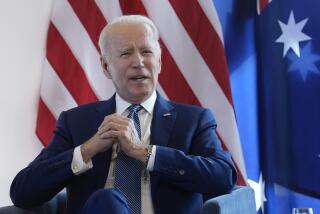U.S., Japan End Trade Talks on Sour Note
WASHINGTON — Two days of high-level negotiations between the United States and Japan ended on a sour note Tuesday, with angry U.S. officials complaining that Tokyo was stonewalling U.S. demands that Japan overhaul domestic business practices that hamper U.S. sales efforts.
Although the talks, known formally as the Structural Impediment Initiative, are not expected to yield any concrete results until next spring, Washington had hoped to persuade Tokyo at least to concede that Japanese business practices posed a problem for export sales.
Instead, U.S. officials said, the Japanese declined even to acknowledge that any of their practices may need revision, blaming the bulk of U.S.-Japanese trade problems on American shortcomings such as the federal budget deficit and short-term thinking by U.S. corporations.
U.S. officials, clearly angered, made no secret of their displeasure at the outcome. Charles Dallara, assistant secretary of the Treasury, told reporters later that “progress was less than we had hoped for” and that the Japanese had shown “little flexibility.”
“We are concerned that while the government of Japan is willing to talk about these issues, it may not at this point share the sense of urgency . . . (about) the threat that our trade imbalances pose,” he said. He expressed hope that Japan would be “more forthcoming.”
The impasse did not signal a breakup of the talks. The two sides have scheduled another session in mid-January, just before an expected election in Japan, and plan to meet again in late March to prepare an interim report before a final session in June.
But the refusal by the Japanese to go further this time around was certain to intensify criticism of Tokyo in Congress, which already has become newly wary about growing Japanese purchases of U.S. corporations and real estate.
And U.S. officials said Washington would have to step up pressure on Tokyo if it hoped to prod the Japanese into drawing up a “blueprint” for joint action by the two countries next spring. The United States also has said it wants a “down payment” in the form of some action by June.
The high-level talks are designed to enable the two countries to discuss broad differences in their countries’ economic and financial structures that each believes is contributing to their bilateral trade problem, with a view toward correcting them over the next few years.
Among the items the United States wants to see changed are alleged exclusionary business practices that Washington says serve to keep imports out; an outmoded product-distribution system; pricing practices; land-use restrictions, and too-close relationships between corporations.
Japan has proffered a similar list of U.S. policies and practices, from the huge U.S. budget deficit to a surfeit of leveraged buyouts and takeovers in businesses and preoccupation by corporations with short-term profits. Tokyo also wants Americans to save more.
More to Read
Inside the business of entertainment
The Wide Shot brings you news, analysis and insights on everything from streaming wars to production — and what it all means for the future.
You may occasionally receive promotional content from the Los Angeles Times.










